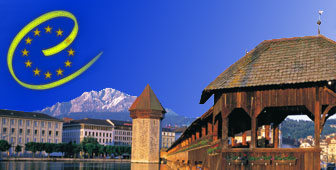Swiss host Council of Europe

Parliamentarians from across Europe are gathering in Lucerne on Monday to discuss a range of issues from asylum and refugees to doping in sport.
It will be only the second time in its history that the Council of Europe Parliamentary Assembly has decamped from Strasbourg to Switzerland. Lausanne had the honour in 1987.
Around 200 of the assembly’s 600 parliamentarians will be making the trip for their spring session, which runs from May 27-29, following an invitation from the Swiss parliament.
Other issues on the agenda include the humanitarian plight of the displaced Kurdish population, Turkey’s controversial Ilisu dam, the state of the world population and social measures for “children of war” in south-eastern Europe.
The assembly opens on Monday – designated a European Day for Asylum, Migration and Refugees – with the Swiss justice minister, Ruth Metzler, scheduled to deliver a speech outlining the country’s migration and refugee policy.
Foreign Minister Joseph Deiss is to meet members of the assembly’s Political Affairs Committee. The committee will also discuss the request by the Federal Republic of Yugoslavia to join the Council of Europe.
Human rights
Founded in 1949, the organisation – not to be confused with the European Union – aims to promote democracy and human rights. But it does not have any legislative powers and can only make recommendations.
However, Claude Frey, president of the House of Representatives foreign affairs committee and an assembly member since 1996, told swissinfo that this does not mean the body is ineffectual.
“The Council of Europe is the only place which brings together western and eastern European countries,” he says. “In this context, since the fall of the Berlin Wall, it is very important.
“Those countries that want to join have to meet European standards such as democracy, political pluralism and respect for human rights.”
Switzerland, which joined in 1963, now has 12 representatives among the 612 members – made up of an equal number of representatives and substitutes.
Moral authority
According to Frey, the Swiss have an important part to play within an organisation which he describes as carrying “moral authority”.
“Switzerland is a small, neutral country which has a proportionately bigger role than some other countries in the activities of the Council of Europe,” he says.
“I have been elected rapporteur for the membership of the Federal Republic of Yugoslavia, ahead of a dozen other candidates. Why? Because Switzerland did not take part in the conflict.
“The missions of the Council of Europe are, in reality, very much Switzerland’s business since we are the depository state of the Geneva Conventions on international human rights.”
by Barbara Speziali, Brussels

In compliance with the JTI standards
More: SWI swissinfo.ch certified by the Journalism Trust Initiative
You can find an overview of ongoing debates with our journalists here . Please join us!
If you want to start a conversation about a topic raised in this article or want to report factual errors, email us at english@swissinfo.ch.